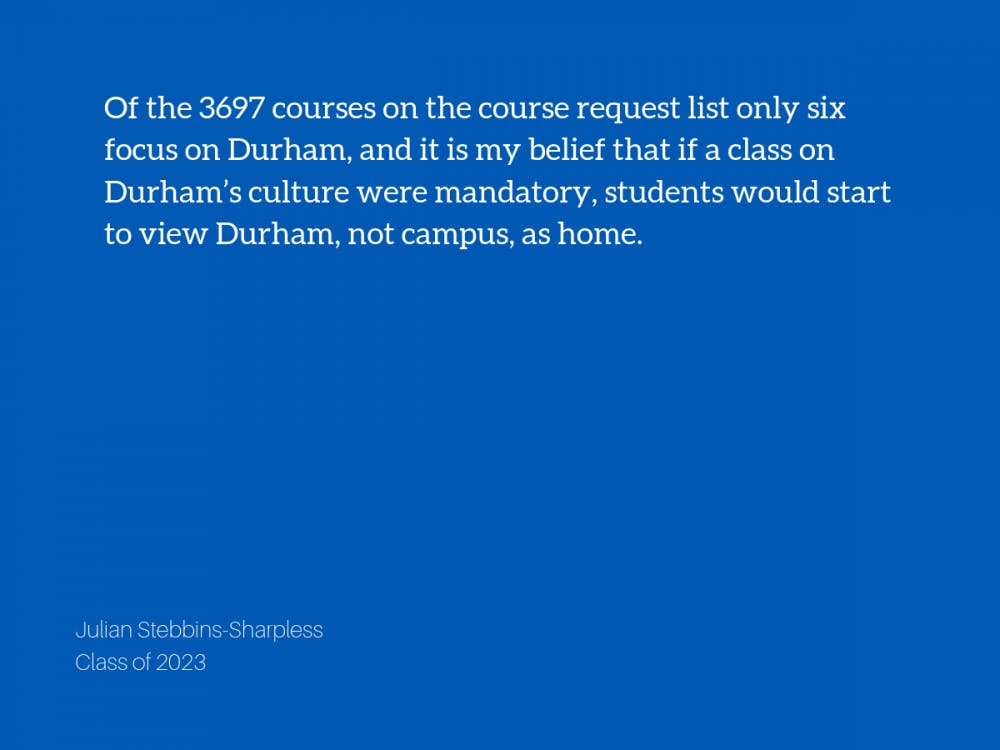Editor's note: Every year, the Duke Honor Council invites incoming first-year students to submit essays inspired by the Duke summer reading book. The following essay by Julian Stebbins-Sharpless was this year's runner-up.
In pursuit of a more equitable future, Duke University has recently acknowledged past missteps and taken actions to remedy them. The campus’s current ideology is reflected in the recognition of the black architect, Julian F Abele, who designed Duke’s iconic gothic campus three decades before the admittance of people of color. At a 2016 ceremony, Abele was finally immortalized when the central West campus quad was renamed in his honor, in hopes that the celebration “of black excellence [would] propel African-American students forward with a feeling of ownership of the place.” The ceremony encapsulated Duke’s efforts to honor the once ignored history and achievements of minorities within its diverse community. From exhibits at the Nasher museum to student led performances, such as Awaaz, and Jabulani, celebrations of the unique cultures, art, and traditions at Duke are part of a conscious effort to prioritize and protect the gallimaufry of diversity on-campus.
While these values are ubiquitous throughout Duke’s community, off-campus is a different story. Being Durham’s largest employer and landowner, Duke could help integrate their philosophy into the surrounding community, whose unique culture is gravely endangered. A recent wave of gentrification has lead to an astounding eviction rate in Durham: one in twenty-eight residents received eviction notices in 2016, particularly in East Durham surrounding the historically black Hayti community. To some degree, this is driven by the relative affluence of Duke students as the median income for our families is three times higher than that of Durham county’s. If students begin to view Durham as more than Duke’s location, a healthy dialogue could arise regarding how we can help the city remain culturally unique. Of the 3697 courses on the course request list only six focus on Durham, and it is my belief that if a class on Durham’s culture were mandatory, students would start to view Durham, not campus, as home.
Similar to Duke, my hometown still deals with its complicated past. I never observed overtly racist sentiments from my fourth grade teacher and future soccer coach; he valued all students equally, and coached with the same philosophy. However, he used the stories of confederate soldiers John Pelham, a seventeen year old officer renowned for his unflinching bravery, and Richard Rowland Kirkland, the “angel of Marye’s heights,” to “energize” us before soccer games. They never hit home and always felt weirdly out of touch. While their names were drilled into my head, I knew little of the 12,000 plus slaves who lived, died and suffered in Fredericksburg and the surrounding countryside. I believe such a skewed knowledge of history leads at best to well intended yet ignorant actions. At its worst, it exacerbates underlying racist sentiments, like those of the “heritage not hate” group who try to legitimatize the history of the confederate states.
When discussions arose regarding the fate of a former slave auction block marring the heart of our town, I, with my egregious lack of historical knowledge in place, unquestioningly supported its removal. However, while attending a city council meeting, my opinion shifted upon hearing the passionate argument of an African-American woman against its removal. She argued that it would only further destroy memories of the horror of slavery and continue to whitewash my town’s history. After listening to her speak, I realized I had become part of the problem regarding historical narratives. I made a decision on a complex topic I was not a part of based on skewed information and no cultural understanding. I have since adopted a new approach when seeking to understand my community’s stories. I sit and listen. I have no way of understanding the background and desires of others unless I first internalize their words and thoughts. Being in the majority, I should act as a mouthpiece for others, not overshadow their words with my own opinions and judgements; it is not my place to decide what others want and need, only to support them if they ask for it and celebrate alongside them when I can.
Julian Stebbins-Sharpless is a first-year.
Get The Chronicle straight to your inbox
Signup for our weekly newsletter. Cancel at any time.

